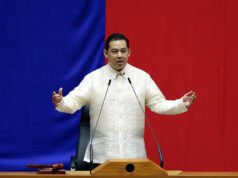Rights watchdog flags new leaders’ authoritarianism
US PRESIDENT Donald J. Trump and his Philippine counterpart, Rodrigo R. Duterte, are among a new breed of leaders around the world who seek to use their democratic mandate to undermine the rule of law, the head of a legal and human rights watchdog said on Wednesday.

“What is different now is that a certain kind of populism is being used to actually counter the notion of the rule of law,” Saman Zia-Zarifi, secretary-general of the International Commission of Jurists (ICJ), said in an interview at the ICJ’s headquarters in Geneva.
ICJ is described in its Web site thus: “Composed of 60 eminent judges and lawyers from all regions of the world, the International Commission of Jurists promotes and protects human rights through the Rule of Law, by using its unique legal expertise to develop and strengthen national and international justice systems.”
“Established in 1952 and active on the five continents, the ICJ aims to ensure the progressive development and effective implementation of international human rights and international humanitarian law; secure the realization of civil, cultural, economic, political and social rights; safeguard the separation of powers; and guarantee the independence of the judiciary and legal profession.”
Mr. Zarifi, who took over at the ICJ in April, described Mr. Trump as an “authoritarian populist” and compared him to the leaders of Turkey, the Philippines, Hungary and Venezuela.
He said the new breed of populists included Turkey’s President Tayyip Erdogan, Venezuela’s Nicolas Maduro, Hungary’s Prime Minister Viktor Orban, Poland’s Jaroslaw Kaczynski, and the Philippines’ Mr. Duterte.
‘CHECKS AND BALANCES’
Mr. Zarifi cited as an example Mr. Trump’s travel ban on nationals from six Muslim-majority countries, a policy that he called “highly problematic” under the US Constitution and international law.
The US Supreme Court revised parts of Mr. Trump’s executive order banning travelers from Iran, Libya, Somalia, Sudan, Syria and Yemen, a policy Mr. Trump says is aimed at tackling terrorism.
“Looking at it again from the point of view of US law — I’m an American lawyer — it seems highly problematic,” said the Iranian-born Mr. Zarifi, who moved to the United States as a teenager and holds a law degree from Cornell University.
Supreme Court rulings would be, he said, “a test for the health of the system of checks and balances in the US.”
“I would say that in the US, Trump is an authoritarian populist. He has authoritarian tendencies but he still is facing checks and balances,” Mr. Zarifi said. “So he is not a full-blown authoritarian figure.”
“The new populism has a certain shamelessness about it that is new. It’s not that people are denying that they are violating rights, what they are saying is they can violate rights because somehow they are empowered by the people,” he said. — Reuters



